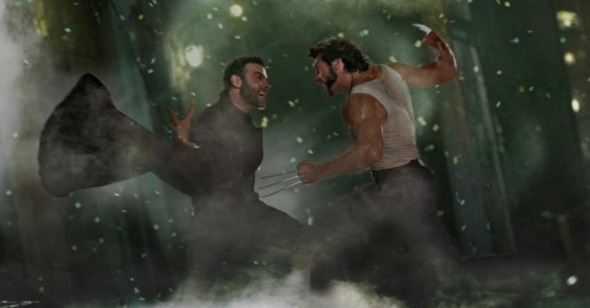Declawed
By Brandon Colvin
X-Men Origins: Wolverine
Dir. Gavin Hood, 20th Century Fox, U.S.
The first self-defeating blockbuster of the summer, X-Men Origins: Wolverine is the sort of big-budget mess that again demonstrates that explosions, slow-mo, and intricate set pieces can never replace pathos, pacing, and a commitment to storytelling. Awkwardly grasping for relevance in the post–Dark Knight climate of superhero seriousness, Wolverine attempts to engage with sociopolitical issues, namely the psychology and ideology of the soldier, which smack of director Gavin Hood’s previous projects—2005’s Best Foreign Film Oscar-winner Tsotsi and 2007’s Bush-era art-thriller bomb Rendition. However, the script by David Benioff and Skip Woods is too trite and unfocused to realize its loftier ambitions. Instead, Wolverine spends most of its time introducing and killing off marginal characters, obliterating dramatic development via shoot-outs and embarrassing melodrama, and bouncing from one snarky one-liner to the next.
The biggest frustration about this comic book prequel/Hugh Jackman vehicle is how sharply it veers away from its promising exposition. A hotbed of thematic potential, Wolverine’s precredit prologue and subsequent skillful credit montage lay the groundwork for a psychologically intriguing and relatively thought-provoking portrait of James Howlett/Logan/Wolverine and his sometimes ally, sometimes nemesis of a half-brother, Victor Creed/Sabretooth (Liev Schreiber)—not that this is sufficiently explored or probed throughout the convoluted plot.
The film begins in Canada, 1845, with an adolescent James bedridden, and watched over by young Victor, as well as James’s adoptive father, John Howlett (assumed by the sickly mutant to be his actual father). However, when Victor’s destructive papa shows up in a fit of unexplained rage, he attacks and murders the elder Howlett, causing furious little James’s bone claws to erupt from his knuckles before he leaps onto daddy Creed and pierces his throat, mortally wounding him. As the hulking murderer dies, however, he whispers to the berserk child that he is his real father, a fact confirmed by James’s mother, Elisabeth. Instantly, the young Sabretooth, muttering that their shared father “deserved it,” grabs the bewildered young Wolverine and they dart into the snowy woods, leaving behind the bloody Oedipal insanity. This haunting, defining incident is left untouched for the remainder of the movie—one of many dead ends, discarded subplots and half-hatched motivations.
Even more impressive than this Sophoclean opening is the craftily edited and wonderfully economic credit montage, reminiscent of the recent opening of Zack Snyder’s Watchmen. Following the perpetually youthful superhuman brothers as they battle through a series of American conflicts—the Civil War, both World Wars, and Vietnam—and spanning a century of combat in a matter of minutes, the artfully photographed and smoothly flowing sequence (complete with freeze frames, blown-out lighting, and clever match-cuts) also presents the downhill tumble of Wolverine and Sabretooth’s relationship. Moving from patriotic heroes to morally compromised exploiters, the two slowly succumb to their ruthless blood thirst until Wolverine’s conscience starts nagging him, causing him to try and pacify his more vicious comrade, but to no avail. In a fit of rage, Sabretooth fires on American troops, sentencing both mutants to death by firing squad. Of course, they both survive the ceremonial shooting as a result of their amplified healing factor; the film, however, does not. In the wake of this potentially intriguing symbolic critique of American imperialism—Wolverine being the wavering avatar of post-Vietnam self-awareness—one might expect a decent comic book film to follow. Sadly, once the main narrative begins, Wolverine gets mired in a plethora of worn-out action flick tropes, growling and clawing its way into mediocrity.
Immediately after the firing squad scene, Gen. William Stryker enters the picture, played by the master of unexceptional creepsterdom, Danny Huston. Stryker, an egotistical military man with a predilection for extolling the virtues of serving one’s country while also deriving private success from his experimental escapades involving super-soldier mutants, convinces Wolverine and Sabretooth to join his gang of military specialists as they embark upon secret globetrotting missions in search of top secret technology and the like. From this point on, Wolverine becomes downright lazy and terminally unremarkable.
A bevy of superhumans, including the Blob (Kevin Durand), Agent Zero (Daniel Henney), and Deadpool (Ryan Reynolds), make brief and inconsequential cameos, whizzing their way through slow-motion displays in which the laws of physics are shattered, all the while exuding aggressive smart-ass ‘tudes and threatening to drown one another in testosterone. During one adventure in Nigeria, Wolverine quits the force, unable to remain in the group after they murder innocent villagers (the massacre being led by Sabretooth) in their search for a magical metal: adamantium. Prompting the dissolution of the group, Wolverine’s departure sets up the remaining action of the film: Stryker hires the angered Sabretooth to track down Wolverine—now working as a lumberjack in Canada (draft dodger parallels, anyone?)—kill his girlfriend, Kayla Silverfox (Lynn Collins), and trick him into having adamantium fused to his bones, making him an indestructible weapon, code named “Weapon X.” Unwisely, the diabolical Stryker orders Wolverine’s memory to be erased, which justifiably pisses off the testy mutant and sends him running away in a paranoid fury, only to be chased by Stryker, Sabretooth, and a slew of other goons, whom he must evade throughout helicopter attacks, sniper shootings, tank battles, and hand-to-hand confrontations, all the while seeking vengeance for the murdered Kayla.
X-Men Origins: Wolverine degenerates into a series of chases, fight scenes, and CGI effects en route to an absurd finale of nuclear reactor-sized proportions. Any inklings of even meager emotional depth or social consciousness, hinted at by the psychotraumatic opening scene and allegorical credit montage, are stunted and supplanted by plot twists, extraneous tangents, and monotonous action. While recent comic book fare such as Watchmen and The Dark Knight may suffer from an overbearing sense of self-importance, Wolverine ails from the more prevalent problem with superhero movies: total irrelevance. Lacking the fortitude of its titular X-Man’s adamantium claws, Wolverine doesn’t even leave a scratch.
